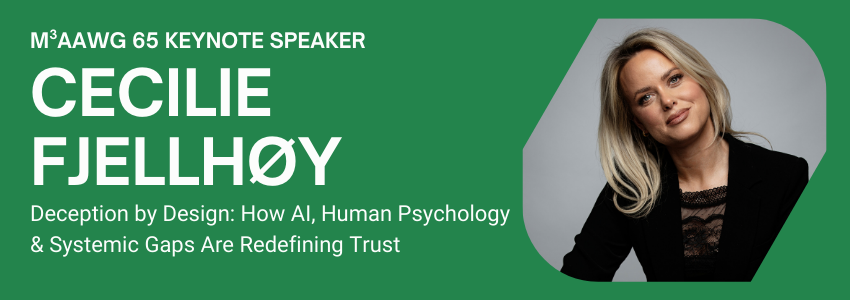
It’s rare for the public to gain an intimate look at the emotional rollercoaster endured by an individual affected by a cyber scam, especially one who believed they had found a soulmate but instead faced a nightmare of not only heartbreak, but also consequences and debt.
Such is the case for Cecilie Fjellhøy, whose keynote address “Deception by Design: How AI, Human Psychology, and Systemic Gaps Are Redefining Trust” is scheduled to headline M3AAWG’s 65th General Meeting from October 13-16, 2025, in Charlotte, North Carolina.
Cecilie gained global attention in 2022 with the release of the wildly popular Netflix documentary “The Tinder Swindler,” where her story is told. However, many untold tales remain in the documentary’s wake, within this intersection of technology, human emotion, and the protection of future scam targets.
Cecilie will bring the full story with her to the keynote address in Charlotte.
Background on a Horrific Scam
The documentary was among Netflix’s most popular ever at the time of its release, telling the story of romantic hopes crushed under the weight of technological deception, resulting in £200,000 in high-interest loans being lost to the scammer.
In the documentary, an Israeli-born conman uses the Tinder app to connect with love interests, using sophisticated romantic tactics to manipulate new targets into financially supporting him through loans and maxed-out credit cards.
As this twisted pyramid scheme built on cybercrime and false hopes of love unravels, Cecilie and other scam survivors engage the media and law enforcement to attempt to end the nightmare.
"All of these victims, including me, have to be nice individuals. That's the worst part about this crime. They go after your qualities -- that you’re empathetic, loving, giving, and trusting. All of these are qualities we would love to have in a friend or a loved one; those are the qualities you need to become a victim of a romance scam," she said.
Frustrations Mount for the Innocent Party
The scam's unfolding also led to victim-blaming in Cecilie’s case. When a 2019 story first broke in Norway's Verdens Gang (VG) newspaper about Cecilie’s ordeal, trolls immediately disparaged the scam survivors in comment sections and on social media.
“I was prepared and knew this would be tough," Cecilie said.
While Cecilie tried to prepare herself for the backlash, she notes that most romance scam survivors are caught off guard by the judgment they face from loved ones, friends, financial institutions, and law enforcement. As a result of her experience, Cecilie is now a global advocate for raising scam awareness, with a key focus on the importance of working with policymakers to drive meaningful change in preventing scams.
“Interpol was never asked to assist in this case, which I find deeply troubling. There has never been a coordinated international effort to bring my scammer to justice, which seems unbelievable to me. It highlights just how misplaced law enforcement’s priorities can be when it comes to scams,” she added.
As the cornerstone of one of M3AAWG's newly evolved priorities—Policy and Regulation—M3AAWG strives to leverage the collective expertise of its community and partner organizations to educate lawmakers on policy decisions, industry standards, and legal frameworks. M3AAWG aims to help prevent future app-based scams and cybercrimes like the one experienced by Cecilie, and countless others.
Next Steps to Protect Victims
Cecilie has been clear that The Tinder Swindler documentary only scratched the surface of the scam’s impact, especially its lasting financial and emotional toll. In her upcoming keynote, she will address these overlooked dimensions, underscore the urgent need for advocacy and awareness, and spotlight how scam operations are evolving to exploit human trust.
Her advocacy extends beyond the keynote: Cecilie’s new Netflix series, Love Con Revenge (launching tomorrow, September 5th), aims to bring justice and visibility to scam survivors, while her recently released book, Co-Authored with Pernilla Sjöholm, Swindled Ever After, shares the broader lessons of her experience to help others recognize and resist romance scams.
Cecilie is also the co-founder of LoveSaid, a survivor-led organization dedicated to preventing romance fraud and driving systemic change for those impacted by romance scams. Through LoveSaid, she works to turn painful experiences into proactive advocacy, offering survivors both a community of support and practical resources for recovery. The organization partners with policymakers, financial institutions, and online platforms to push for stronger safeguards that protect vulnerable individuals from exploitation.
LoveSaid also amplifies the voices of scam survivors, breaking down the stigma and shame often associated with being targeted. By reframing the narrative—shifting blame away from the victims and onto the perpetrators—Cecilie and her team aim to empower those impacted and create a culture where people feel safe to come forward, seek help, and share their stories.
This commitment ensures that Cecilie’s work extends beyond awareness: through LoveSaid, she is helping to build a more resilient, informed, and compassionate global response to romance fraud.
“Romance scams exploit hope and love to drain bank accounts, leaving victims financially and emotionally shattered. Draining life savings and stealing financial security, which victims have worked their whole lives to build, is just the start of the rippling effects of this type of scam. As M3AAWG continues to highlight these evolving threats, our goal is to not only raise awareness but also drive global collaboration and stronger protections. By sharing experiences and raising voices like Cecilie’s along with insights from our community, we can help ensure fewer people face these devastating scams in the future,” says M3AAWG Board of Directors Chairperson Sara Roper.
Stay tuned to M3AAWG social media and this blog for Part II of our coverage, where we’ll take a deeper look at Cecilie’s work to protect people worldwide through her advocacy, writing, and media projects.



